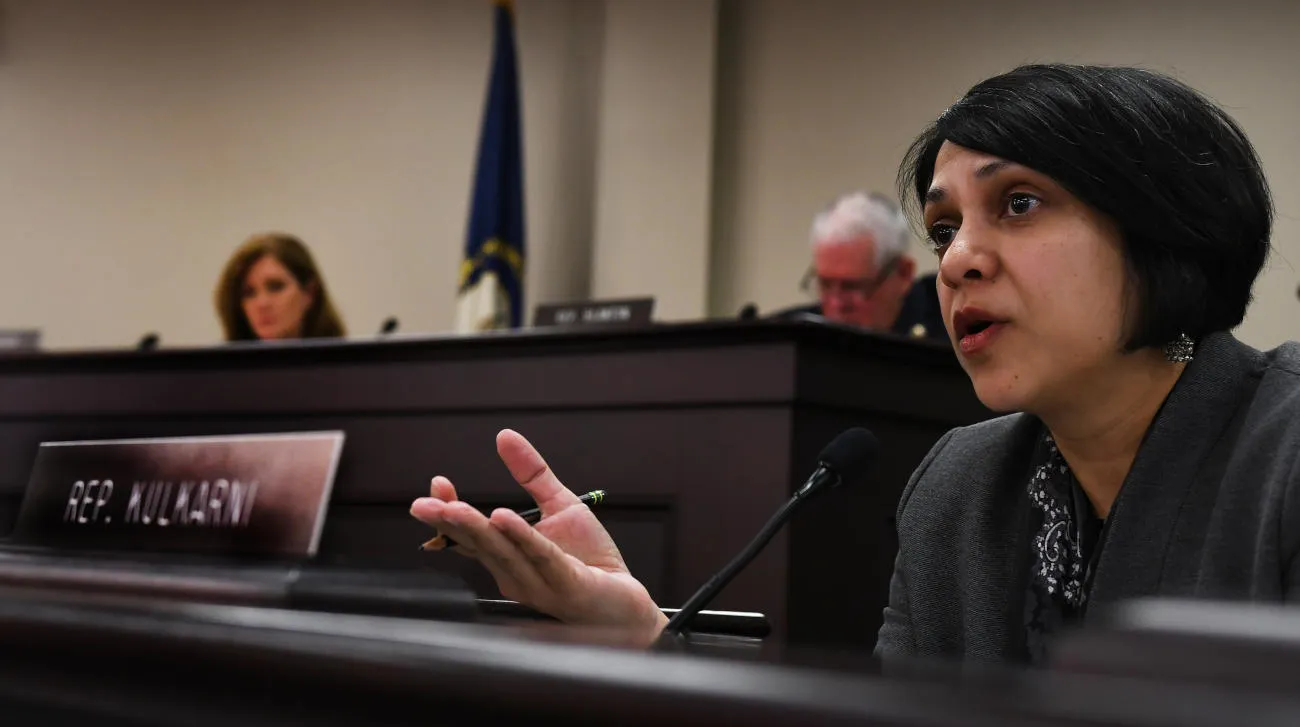(From the Herald-Leader)
The Kentucky Supreme Court on Friday disqualified state Rep. Nima Kulkarni as a Democratic primary candidate less than three weeks after she won the primary.
A majority of justices issued the decision Friday, adding that a full ruling will come later. The order was issued one day after the court heard oral arguments from both sides.
Kulkarni, a Democratic immigration attorney from Louisville, won the May 21 primary for House District 40 and was seeking a fourth term.
Though the path forward is still unclear without a full ruling yet, Kulkarni’s side believes it’s likely that she’ll get another shot at re-election. Kulkarni’s attorney, James Craig, told the Herald-Leader he anticipates the order will be “just a speed bump” on the way to Kulkarni getting sworn into office again. He mentioned the possibility of her winning her party’s nomination in a special election or party nomination process.
Read the rest at the Herald Leader.
(earlier) KY Supreme Court hears arguments in Kulkarni candidacy challenge
FRANKFORT — The Kentucky Supreme Court heard oral arguments Thursday in a lawsuit that could potentially lead to a sitting Democratic lawmaker being removed from the ballot.
The day before Kentucky’s May primary election, the state Supreme Court allowed Rep. Nima Kulkarni to stand as a candidate, pending oral arguments.
Before the primary election, the Kentucky Court of Appeals ruled that Kulkarni, of Louisville, was not a bona fide candidate and overturned a dismissal in Jefferson County Circuit Court.
According to unofficial results, Kulkarni took 78% of the vote in the 40th House District Democratic primary in May over challenger William Zeitz. No Republican candidates filed for the election.
The lawsuit, filed by former Democratic state Rep. Dennis Horlander, centers around the validity of Kulkarni’s candidacy papers. They had to be signed by two witnesses who are Democratic voters in the 40th District. At the time of signing, one witness was a registered Republican and changed her registration after the filing deadline. Kulkarni previously testified she thought the voter was a registered Democrat and only later became aware of the issue.
Kulkarni defeated Horlander in the 2018 and 2020 Democratic primaries in the 40th House District. Kulkarni seeks a fourth term in office.
The seven justices on the court asked several questions of both sides. To James Craig, Kulkarni’s attorney, Justice Kelly Thompson asked what deadline the court should consider the paperwork was finalized. This year, Kentucky’s filing deadline was Jan. 5, and Kulkarni learned of the error the following Monday, Jan. 8. Horlander did not file his lawsuit until March 8.
Craig argued it could not be the date that the lawsuit was filed.
“We can see that the good faith action has happened by that date,” Craig said, referring to Kulkarni’s actions before the certification date.
Of checking a person’s voter registration, which is a public record, Chief Justice Laurance VanMeter said “that is so easy to check” and candidates have an obligation to check.
VanMeter also asked Craig what the court should do for the outcome of the election should it rule that Kulkarni was not a bona fide candidate in the primary. Craig said that it would fall to Republican and Democratic executive committees to nominate candidates, and Kulkarni could seek office again in a general election.
Steven Megerle, Hornlander’s attorney, disagreed and said the Jefferson County Clerk would have to hold a special Democratic primary election in the 40th House District, because of recent legislation, and Kulkarni could not be an eligible candidate for that election if she is disqualified. The law says that disqualified or defeated primary candidates cannot be general election candidates unless there is a vacancy.
While questioning Megerle, Justice Michelle Keller said she was “struggling with the notion of Rep. Kulkarni’s good faith.” As Kentucky’s justices are elected, Keller related it to her own campaign experience, noting that some candidates miss filing deadlines for campaign finance reports but “way past the time that it made any difference in the management of a campaign, any real difference.”
Megerle argued that because Kentucky has long had closed party primaries, Republicans cannot nominate Democratic candidates and vice versa.
“This court will effectively crack open the partisan primary system, and Republicans get to nominate Democrats and Democrats can nominate Republicans,” he said.
VanMeter said there was a situation in 1920 where Democratic voters were allowed to nominate a Republican judicial candidate before judicial races became nonpartisan.
After arguments concluded, Megerle highlighted an amicus brief filed by Republican House Speaker David Osborne and Senate President Robert Stivers. It urges the Supreme Court to ignore a written statement from Senate Democratic Floor Leader Gerald Neal about interpreting a 1990 change to the state’s candidacy filing law. Craig had cited Neal, as he was in the legislature during that time.
“That is really telling, the fact that the two highest ranking members of the General Assembly weighed in on this case over Rep. Kulkarni,” Megerle said.
Asked by reporters if he planned to run in a possible special election. Horlander said he would “have to give that a lot of thought.”
Kulkarni declined to comment.
VanMeter said the court would render a decision as soon as possible.
--30--
Written by McKenna Horsley. Cross-posted from the Kentucky Lantern.








